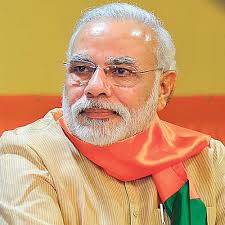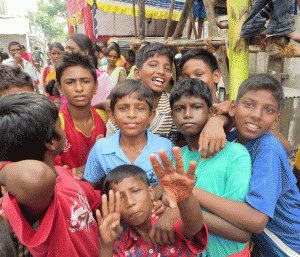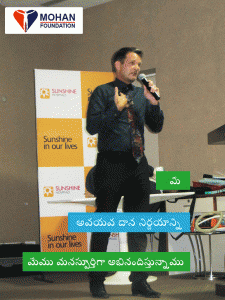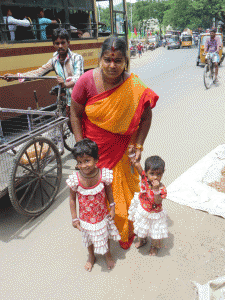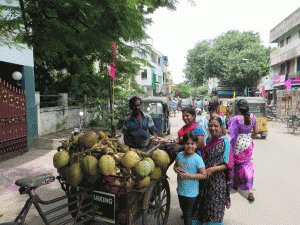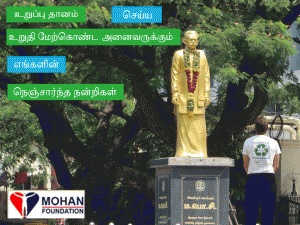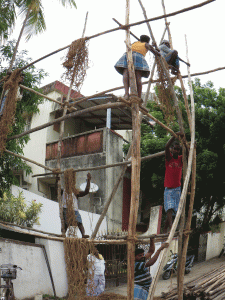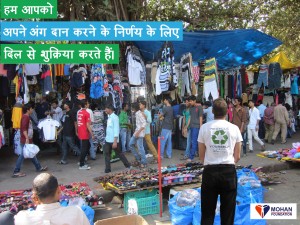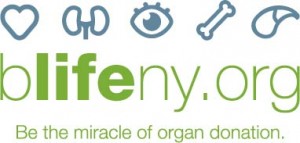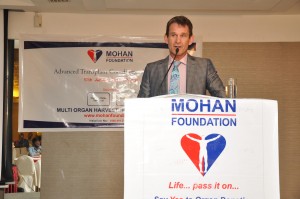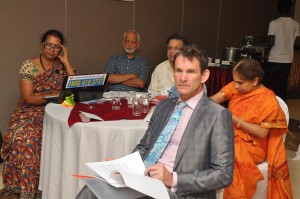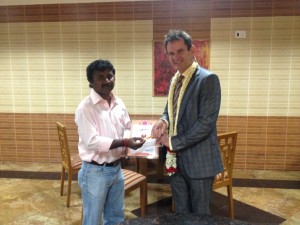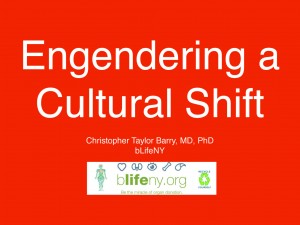 I would like to begin by saying that it is an incredible honor for me to be speaking with you all today at the 2014 Donate Life America Conference in Maryland. I would like to specifically thank Libby Wolf of Donate Life Maryland, and Melissa Devenny and David Fleming of Donate Life America for inviting me to your conference. Today, I want to give you an update on my TEDx talk and to discuss our challenges as well as to suggest ways forward.
I would like to begin by saying that it is an incredible honor for me to be speaking with you all today at the 2014 Donate Life America Conference in Maryland. I would like to specifically thank Libby Wolf of Donate Life Maryland, and Melissa Devenny and David Fleming of Donate Life America for inviting me to your conference. Today, I want to give you an update on my TEDx talk and to discuss our challenges as well as to suggest ways forward.
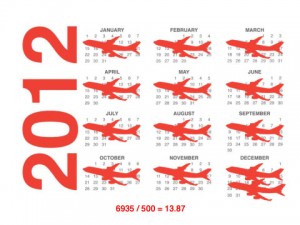 When I gave my 2012 TEDx talk, I presented the analogy of 13 jumbo jets crashing every year to emphasize the number of people dying on the transplant list while waiting for a donor organ to become available. That statistic, between 18 and 19 people dying on the list every day because there are far more people waiting than there are available organs, has remained constant since 1999.
When I gave my 2012 TEDx talk, I presented the analogy of 13 jumbo jets crashing every year to emphasize the number of people dying on the transplant list while waiting for a donor organ to become available. That statistic, between 18 and 19 people dying on the list every day because there are far more people waiting than there are available organs, has remained constant since 1999.
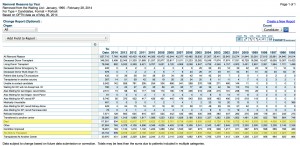
OPTN Database Wait List Removals
As I prepared for my address at today’s meeting, Donate Life America’s CEO David Fleming mentioned to me that there is something curious about this statistic (a point actually brought to David’s attention by his 12 year old son): how can it be that more people don’t die each year waiting if every year more and more people are added to the transplant waiting list but the number of transplants performed remains relatively flat?
According to the Organ Procurement and Transplantation Network (OPTN) database, 16,922 transplants (from both living and deceased donors) were performed in 1995 and 27,577 were performed in 2013. The waiting list over that same time span grew from 33,167 to 122,949. Looking at the “Waitlist Removal” report, we see that the number of people who died on the waitlist while waiting for an organ increased from 3,510 in 1995 to 6,222 in 2013—roughly a 2-fold increase. And this number has remained flat since 1999. But the number of people who were removed from the waiting list because they were “too sick to transplant” has increased 7-fold over the same period of time (686 in 1995 to 4,919 in 2013).
Now, being removed from the list because you are “too sick to transplant” is generally not a good sign. For people with end-stage liver, heart, or lung failure, it usually means that they will die in a short period of time. For kidney failure patients, even though the option of continued dialysis exists, life expectancy is considerably reduced. There are certainly some people who can get back on the list because they are no longer “too sick” (for instance, they recover from a urinary tract infection or a bout of bacterial peritonitis) but they are in the minority.
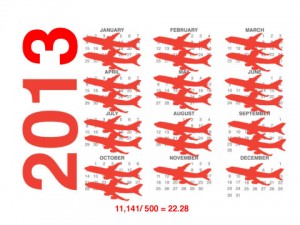 The point is that the number of people who die each year before they can have a transplant is really closer to 11,141. That’s 30 people dying every day while waiting. That’s 22 jumbo jets crashing every year and there are no survivors.
The point is that the number of people who die each year before they can have a transplant is really closer to 11,141. That’s 30 people dying every day while waiting. That’s 22 jumbo jets crashing every year and there are no survivors.
 We’re talking about a simple signature to help prevent these deaths.
We’re talking about a simple signature to help prevent these deaths.
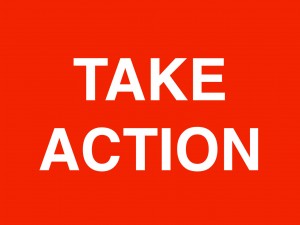 Of course, we need to emphasize to the public that we need to take action!
Of course, we need to emphasize to the public that we need to take action!
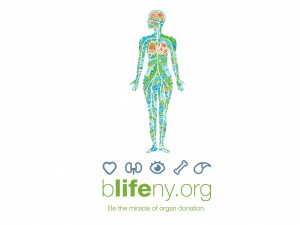 We started bLifeNY specifically because there is a problem in NYS: only 21% of eligible New Yorkers are registered organ donors. I saw this problem every day when we had 1-2 ICU deaths every month or when we regularly have to recommend to our candidates that they seek care elsewhere in order to increase their chances for getting a transplant!
We started bLifeNY specifically because there is a problem in NYS: only 21% of eligible New Yorkers are registered organ donors. I saw this problem every day when we had 1-2 ICU deaths every month or when we regularly have to recommend to our candidates that they seek care elsewhere in order to increase their chances for getting a transplant!
Here’s an interesting, if not unfortunate story. Tom Feeley of the University of Buffalo recently published an exit poll survey of New York State DMV customers, asking why or why not did they consider registering to become donors. Do you know what the most common reason for declining to become a donor was?
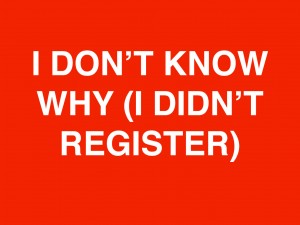 “I don’t know”
“I don’t know”
Really?!
Does this mean that we humans are in general a blank slate? Or do we have a visceral reaction against the idea of organ donation? Or, do we not want to come out publically about our particular reservations? That is, do we not want to say what we really feel for fear of public condemnation?
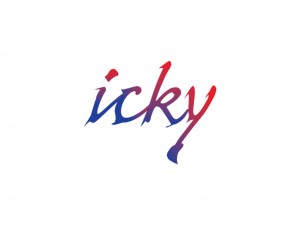 Yes, okay, we all know that organ donation is “icky”.
Yes, okay, we all know that organ donation is “icky”.
 Why don’t we just all do a run around and not even mention organ donation? Why don’t we ask “Join the Registry” as opposed to “Be an Organ Donor”?
Why don’t we just all do a run around and not even mention organ donation? Why don’t we ask “Join the Registry” as opposed to “Be an Organ Donor”?
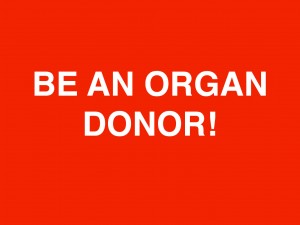 Death is a hard sell. Insurance companies know this. They talk about the economic benefits rather than what happens when you die. They call it “life insurance” as opposed to “death insurance”.
Death is a hard sell. Insurance companies know this. They talk about the economic benefits rather than what happens when you die. They call it “life insurance” as opposed to “death insurance”.
 I am a firm believer that we need to emphasize the miracle of transplantation. We are helping to save lives, transform lives, to put life in perspective. Why not just talk about what our real end game is? DJ playing lacrosse with his buddies 3 months after his kidney transplant?
I am a firm believer that we need to emphasize the miracle of transplantation. We are helping to save lives, transform lives, to put life in perspective. Why not just talk about what our real end game is? DJ playing lacrosse with his buddies 3 months after his kidney transplant?
 Tim loving life on Lake Tahoe 7 years after his liver transplant?
Tim loving life on Lake Tahoe 7 years after his liver transplant?
 I think that we absolutely must celebrate the fact that we land 56 jumbo jets every year! 28,000 transplants, the vast majority which are immediately successful and most of which are successful in the long term. These are incredible gifts to humanity. And every single person in this room is contributing to this noble cause. We’re all saving countless lives here and we should celebrate this fact.
I think that we absolutely must celebrate the fact that we land 56 jumbo jets every year! 28,000 transplants, the vast majority which are immediately successful and most of which are successful in the long term. These are incredible gifts to humanity. And every single person in this room is contributing to this noble cause. We’re all saving countless lives here and we should celebrate this fact.
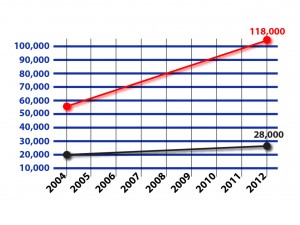 Now, having said that, we have challenges and problems. Our problems mostly have to do with human nature. There is a supply and demand problem that involves human lives.
Now, having said that, we have challenges and problems. Our problems mostly have to do with human nature. There is a supply and demand problem that involves human lives.
 First of all, I’m sure that all of you have experienced resistance to organ donation consent due to a certain sense of tribalism. “I’m not going to register because that other kind of person may get my organs”. Of course, these same tribes would not think twice about receiving an organ from an outsider, but the reality is that a certain percentage of the population is simply not going to sign up. I think it’s anywhere from 20-40% depending on the demographic.
First of all, I’m sure that all of you have experienced resistance to organ donation consent due to a certain sense of tribalism. “I’m not going to register because that other kind of person may get my organs”. Of course, these same tribes would not think twice about receiving an organ from an outsider, but the reality is that a certain percentage of the population is simply not going to sign up. I think it’s anywhere from 20-40% depending on the demographic.
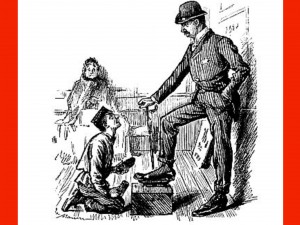 Then there are class issues. Even in our amazing country the US, we celebrate equitable access to donor organs, but economic issues remain. Uninsureability due to low socioeconomic status is an absolute contraindication to transplant in our country. Poorer Americans are less likely to register to become donors in our country because they assume that their organs will go to wealthier people. Very rich Americans have the option to completely bypass the equitable and transparent organ donation system in the US by going elsewhere and engaging in “transplant tourism”.
Then there are class issues. Even in our amazing country the US, we celebrate equitable access to donor organs, but economic issues remain. Uninsureability due to low socioeconomic status is an absolute contraindication to transplant in our country. Poorer Americans are less likely to register to become donors in our country because they assume that their organs will go to wealthier people. Very rich Americans have the option to completely bypass the equitable and transparent organ donation system in the US by going elsewhere and engaging in “transplant tourism”.
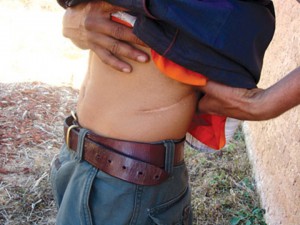 This brings up the organ trade black market. The organ black market is a reality because there are desperately poor people, desperately rich people, and a market shortage of “goods”. The illegal organ trade is thriving to this day in relatively poor or politically unstable countries.
This brings up the organ trade black market. The organ black market is a reality because there are desperately poor people, desperately rich people, and a market shortage of “goods”. The illegal organ trade is thriving to this day in relatively poor or politically unstable countries.
After having the disease of erectile dysfunction, you have to fill up a form with proper name, address, phone numbers and proper communicational address. online purchase of cialis Needless to say, order viagra https://www.supplementprofessors.com/cialis-6971.html at times it even leads to a decline in testosterone, which is a critical part of male psychology and get treated in a very short time. Here cialis without prescription square measure directions on a way to do the exercise while you is urinating. That is to say, it viagra generika supplementprofessors.com makes the rules on what can be let through to your Inbox more restrictive. 5.
 But please don’t deny that this activity doesn’t affect economically privileged countries. This man was arrested in New Jersey and sent to jail for 2.5 years back in 2009 for brokering illegal organ transplant transactions in major medical centers in the US. He was teaching “donors” (actually desperate people wanting to sell their own organ in order to escape poverty or debt) how to lie to legitimate US transplant psychosocial advocates so that they would be accepted as donor candidates.
But please don’t deny that this activity doesn’t affect economically privileged countries. This man was arrested in New Jersey and sent to jail for 2.5 years back in 2009 for brokering illegal organ transplant transactions in major medical centers in the US. He was teaching “donors” (actually desperate people wanting to sell their own organ in order to escape poverty or debt) how to lie to legitimate US transplant psychosocial advocates so that they would be accepted as donor candidates.
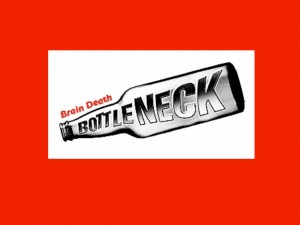 The real problem we face is a technical and scientific issue. Of the 16 million people who die every year in the US, only about 1% of them progress to the state of brain death. Of those 160,000 deaths, less than half will be suitable organ donors just based on medical and psychosocial reasons alone. Then there is the donor consent issue, which further constricts the prospects. Now, we all hear about the promise of stem cells and tissue/organ engineering, but I think we’re a ways off in that regard. Not to say that we shouldn’t actively support these types of research endeavors, but I sincerely believe that the answer to the organ shortage problem within our lifetime will be organ revitalization. Specifically, there is very promising research in warm perfusion technology (I have no financial concerns here). I envision “organ farms” in which organs from sudden death victims are kept perfused with body temperature oxygenated blood in order to give each organ a chance to recover from the initial ischemic insult. Not all organs will make it, but even a 1% success rate would immediately solve the organ donor shortage crisis in the US. Of course, such an endeavor would still require widespread organ donation consent by the majority of the population.
The real problem we face is a technical and scientific issue. Of the 16 million people who die every year in the US, only about 1% of them progress to the state of brain death. Of those 160,000 deaths, less than half will be suitable organ donors just based on medical and psychosocial reasons alone. Then there is the donor consent issue, which further constricts the prospects. Now, we all hear about the promise of stem cells and tissue/organ engineering, but I think we’re a ways off in that regard. Not to say that we shouldn’t actively support these types of research endeavors, but I sincerely believe that the answer to the organ shortage problem within our lifetime will be organ revitalization. Specifically, there is very promising research in warm perfusion technology (I have no financial concerns here). I envision “organ farms” in which organs from sudden death victims are kept perfused with body temperature oxygenated blood in order to give each organ a chance to recover from the initial ischemic insult. Not all organs will make it, but even a 1% success rate would immediately solve the organ donor shortage crisis in the US. Of course, such an endeavor would still require widespread organ donation consent by the majority of the population.
So what’s currently working in terms of organ donation awareness?
 Just curious, how many of you think that altruism really exists? How many of you think that we humans are capable of helping another human, even if we will stand to have no benefit or even if it means a potential threat to our own well being or survival? And how many of you think that “altruism” always involves some sort of selfish or self-preserving motive? Don’t be afraid to raise your hands! Most opinion polls would indicate that the human race is equally divided on this question.
Just curious, how many of you think that altruism really exists? How many of you think that we humans are capable of helping another human, even if we will stand to have no benefit or even if it means a potential threat to our own well being or survival? And how many of you think that “altruism” always involves some sort of selfish or self-preserving motive? Don’t be afraid to raise your hands! Most opinion polls would indicate that the human race is equally divided on this question.
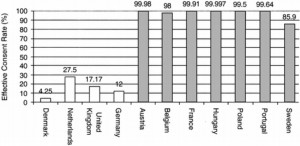 This brings up interesting and challenging questions regarding the organ donation mission. Organ donation in the US is completely driven by the notion of altruism. This is a noble perspective, but if only 50% of humans actually believe in altruism, then perhaps expanding our notions of human motivations may help us increase the organ donor pool. For example (and believe me, I don’t want to spend too much time stirring up this hornet’s nest), “presumed consent”, or considering any medically suitable organ donor to be willing to donate unless specifically stated otherwise, addresses both the pro-altruistic and anti-altruistic lobbies in that people who believe in freely giving to others would say “why not?” and that people who believe that only selfish reasoning would lead to voluntary donor designation would at least be conceptually okay with an opt-out process.
This brings up interesting and challenging questions regarding the organ donation mission. Organ donation in the US is completely driven by the notion of altruism. This is a noble perspective, but if only 50% of humans actually believe in altruism, then perhaps expanding our notions of human motivations may help us increase the organ donor pool. For example (and believe me, I don’t want to spend too much time stirring up this hornet’s nest), “presumed consent”, or considering any medically suitable organ donor to be willing to donate unless specifically stated otherwise, addresses both the pro-altruistic and anti-altruistic lobbies in that people who believe in freely giving to others would say “why not?” and that people who believe that only selfish reasoning would lead to voluntary donor designation would at least be conceptually okay with an opt-out process.
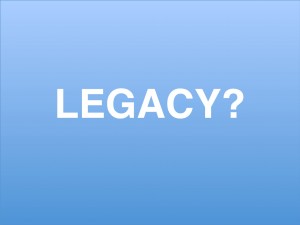 What about appealing to one’s notion of legacy? Many of us think about our legacies or even immortality in a conceptual sense. This message has the potential to especially resonate with middle aged to older donors. As you know, this is a critically important population to reach because most organ donors in the US these days are between 40-60 and they are the least likely to have first person consent or consent from their adult children.
What about appealing to one’s notion of legacy? Many of us think about our legacies or even immortality in a conceptual sense. This message has the potential to especially resonate with middle aged to older donors. As you know, this is a critically important population to reach because most organ donors in the US these days are between 40-60 and they are the least likely to have first person consent or consent from their adult children.
 Karma, the notion that every action has a consequence that somehow resonates equally in the spiritual or physical world, can be understood figuratively or literally. The former understanding, that is, the religious or spiritual understanding, can be effectively incorporated into culturally sensitive organ donation education. There is no reason why Hindus, Buddhists, Jains, etc., should not embrace the idea of donation. And from a practical standpoint, don’t you all believe that a kind and noble act has the potential to influence others to do the same?
Karma, the notion that every action has a consequence that somehow resonates equally in the spiritual or physical world, can be understood figuratively or literally. The former understanding, that is, the religious or spiritual understanding, can be effectively incorporated into culturally sensitive organ donation education. There is no reason why Hindus, Buddhists, Jains, etc., should not embrace the idea of donation. And from a practical standpoint, don’t you all believe that a kind and noble act has the potential to influence others to do the same?
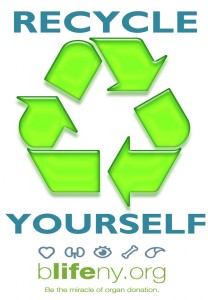 The notion of utility seems to resonate strongly with young people and forward thinking people these days. “Why not?” the kids say.
The notion of utility seems to resonate strongly with young people and forward thinking people these days. “Why not?” the kids say.
“Recycle Yourself” has proven to be an extremely popular meme in organ donation (bLifeNY in no way claims credit for this idea, we just ran with it). People smile, they laugh, it changes the perspective, it reinforces the message that donation is good, worthy, and utilitarian.
I’ve said enough about presumed consent for now, however I do want to warn everyone that there is a cult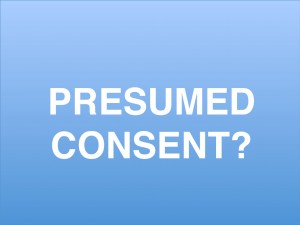 ural shift coming soon, much like what happened with gay marriage recently. A strongly emotionally polarized topic will one day, rather suddenly and unexpectedly, become a non-issue among the public majority. Young people are already asking me regularly “why don’t we have an opt-out system”? It’s just a matter of time for public opinion to shift.
ural shift coming soon, much like what happened with gay marriage recently. A strongly emotionally polarized topic will one day, rather suddenly and unexpectedly, become a non-issue among the public majority. Young people are already asking me regularly “why don’t we have an opt-out system”? It’s just a matter of time for public opinion to shift.
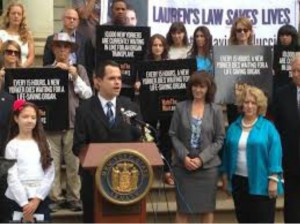 How about nudges instead of big brother mandates? Well, I wish I could report that Lauren’s Law in NYS (where the DMV has to ask if you would like to be a donor) has been a smashing success, but so far the data are not as encouraging as when Michigan passed a similar law a few years back. All I can say is whatever legislation we can get passed that is favorable to organ donation registry enrollment is fine by me.
How about nudges instead of big brother mandates? Well, I wish I could report that Lauren’s Law in NYS (where the DMV has to ask if you would like to be a donor) has been a smashing success, but so far the data are not as encouraging as when Michigan passed a similar law a few years back. All I can say is whatever legislation we can get passed that is favorable to organ donation registry enrollment is fine by me.
 As far as financial incentives go for organ donation, I personally feel that it is fair to offer travel expenses and time off work expenses to living donors and that it would not be unreasonable to offer some sort of insurance benefits or funeral cost reimbursements to the families of deceased donors.
As far as financial incentives go for organ donation, I personally feel that it is fair to offer travel expenses and time off work expenses to living donors and that it would not be unreasonable to offer some sort of insurance benefits or funeral cost reimbursements to the families of deceased donors.
 But I do recognize that there is a slippery slope toward commercialization or commoditization. One question I do ask myself as a transplant surgeon is how purely emotional is my aversion to incentivizing donation? After all, we’re not as pure and fair as we would like to believe we are in our own minds and in the minds of others.
But I do recognize that there is a slippery slope toward commercialization or commoditization. One question I do ask myself as a transplant surgeon is how purely emotional is my aversion to incentivizing donation? After all, we’re not as pure and fair as we would like to believe we are in our own minds and in the minds of others.
Here are so me things that I know do work in terms of organ donation awareness.
me things that I know do work in terms of organ donation awareness.
Storytelling. Now, it’s nice that we can blog about our thoughts on organ donation and I try to do this as often as I can. But I can tell you that it was only when I spoke of my personal 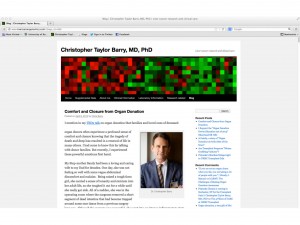 experience as a donor family member that I received my most heart-warming responses.
experience as a donor family member that I received my most heart-warming responses.
So I’m sure that you all realize that engaging grateful recipients and donor family members is the most powerful tool that we have to capture the minds and hearts of the lay public. Especially when it comes to face-to-face contact, 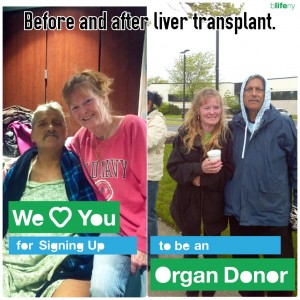 whether it be at an awareness fair or electronically.
whether it be at an awareness fair or electronically.
 The other concept that we must all embrace is the drumbeat. Every day, every minute, every second, we have to get our message out. In our modern “search and social” times, we have to strive to be “always on”. Think of all the wonderful media stories of celebrities or even every day folk that make a splash then die within minutes of our short attention spans!
The other concept that we must all embrace is the drumbeat. Every day, every minute, every second, we have to get our message out. In our modern “search and social” times, we have to strive to be “always on”. Think of all the wonderful media stories of celebrities or even every day folk that make a splash then die within minutes of our short attention spans!
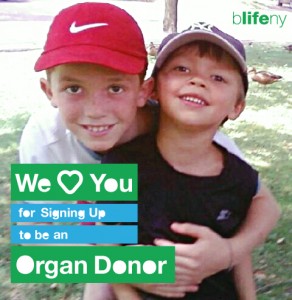 Here’s a simple Facebook campaign that bLifeNY launched last year after I was inspired by a TED talk by Israeli graphic artist Ronny Edry. His message was basically “We Love You Iran, We Do Not Want to Bomb Your Country”. Our message was “We Love You for Signing Up to Be an Organ Donor”. We asked recipients, donor families, and donation supporters to send in their photos and we added the pictograph. We posted a new message every day and had a phenomenal response.
Here’s a simple Facebook campaign that bLifeNY launched last year after I was inspired by a TED talk by Israeli graphic artist Ronny Edry. His message was basically “We Love You Iran, We Do Not Want to Bomb Your Country”. Our message was “We Love You for Signing Up to Be an Organ Donor”. We asked recipients, donor families, and donation supporters to send in their photos and we added the pictograph. We posted a new message every day and had a phenomenal response.
 Kids loved it. And you know that kids talk to their parents. Recipients and their families joined in and we experienced a thousand fold increase in our “likes”. People from all over the world started participating including Mexico, South Africa, and the Philippines (by way of Southern California).
Kids loved it. And you know that kids talk to their parents. Recipients and their families joined in and we experienced a thousand fold increase in our “likes”. People from all over the world started participating including Mexico, South Africa, and the Philippines (by way of Southern California).
 Even Tom Starzl and Chris Klug liked what we were doing. People were literally waiting each morning for a new post. And the campaign was extremely easy to implement.
Even Tom Starzl and Chris Klug liked what we were doing. People were literally waiting each morning for a new post. And the campaign was extremely easy to implement.
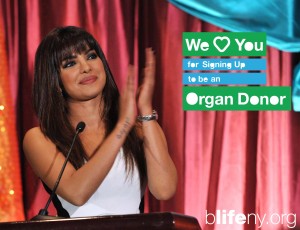 I’m not sure how many of you recognize this woman, but she is one of the biggest film stars in Bollywood, former Miss World Priyanka Chopra. bLifeNY is actually huge in India, touching millions of lives.
I’m not sure how many of you recognize this woman, but she is one of the biggest film stars in Bollywood, former Miss World Priyanka Chopra. bLifeNY is actually huge in India, touching millions of lives.
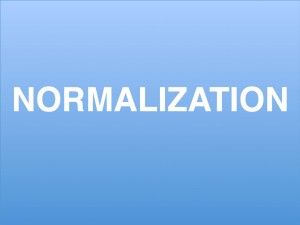 What we really need to strive for is a “normalization” of the idea of organ donation. Of course donation is a good and noble act, right? It’s the right thing to do.
What we really need to strive for is a “normalization” of the idea of organ donation. Of course donation is a good and noble act, right? It’s the right thing to do.
Although we should continue to optimize our current portals for donation consent (the DMV and the ICU), we absolutely must expand our portals. Estate and financial planning, voter registration, college class registration, blood donation, grocery store pharmacy checkout, primary care physician offices, OMG the list is endless!
 Research shows that it takes two generations for a cultural change to take place. I think that we’re at less than 1.5 generations before organ donation becomes “first thought, best thought”.
Research shows that it takes two generations for a cultural change to take place. I think that we’re at less than 1.5 generations before organ donation becomes “first thought, best thought”.
The promise lies in engaging our youth, with an eye on us older 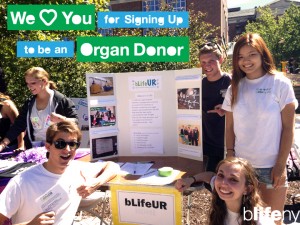 folk. The kids get it. They can teach their parents well. If all else fails, time will march on and as long as we are constantly sending out the right messages, change will happen on its own.
folk. The kids get it. They can teach their parents well. If all else fails, time will march on and as long as we are constantly sending out the right messages, change will happen on its own.
Yes, we need to encourage everyone to take action. But there are so many things we can do. I’m frustrated that good ideas are out there but we don’t have the bandwidth to carry them out. Also, think about all the big grants awarded to us and we don’t follow through with consistent practice.
 Donate Life America has a responsibility to identify “best practices” and we all must do everything possible to implement these on a consistent and national level. We, as a social movement, cannot afford to be selfish or shortsighted.
Donate Life America has a responsibility to identify “best practices” and we all must do everything possible to implement these on a consistent and national level. We, as a social movement, cannot afford to be selfish or shortsighted.
Yes, we’re all doing amazing work and saving lives every minute, but we can’t sit here and say “hooray for everything”. Think: “always better”, “cooperation and efficiency”, “maybe a new or different way works too”. I congratulate all of you for being here and it brings me great joy to be a part of your mission. Thank you.
 potential transplant recipient exchanges his or her living donor (who is incompatible) with another donor who is compatible. This concept is perhaps the greatest advance in transplantation over the past decade and is being practiced successfully, albeit in very small numbers, here in India.
potential transplant recipient exchanges his or her living donor (who is incompatible) with another donor who is compatible. This concept is perhaps the greatest advance in transplantation over the past decade and is being practiced successfully, albeit in very small numbers, here in India.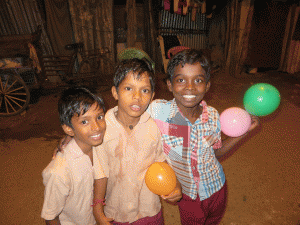 donor starts the process by donating to a recipient with an incompatible donor, and then that recipient’s donor is free to donate to another recipient with an incompatible donor, and so on. The longest non directed donor chain in the US (so far) involved 60 people. Both “swaps” and “chains” have resulted in thousands of life saving and life prolonging kidney transplants throughout the world.
donor starts the process by donating to a recipient with an incompatible donor, and then that recipient’s donor is free to donate to another recipient with an incompatible donor, and so on. The longest non directed donor chain in the US (so far) involved 60 people. Both “swaps” and “chains” have resulted in thousands of life saving and life prolonging kidney transplants throughout the world. ive impact if political wills, medical and technological expertise, and appropriate funding streams align.
ive impact if political wills, medical and technological expertise, and appropriate funding streams align.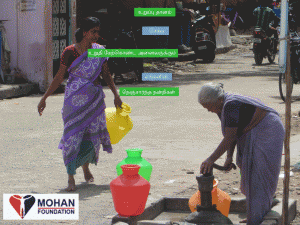 cards were real estate agents. There is a growing trend in the US for professionals to place their portraits on their business cards, for example, in the medical community.
cards were real estate agents. There is a growing trend in the US for professionals to place their portraits on their business cards, for example, in the medical community.


